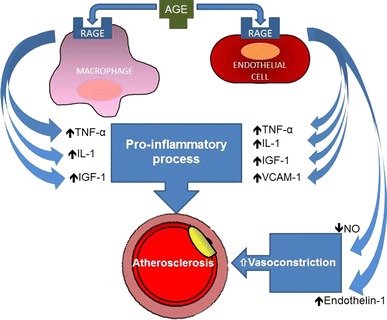Fig. 1.

Cellular binding of advanced glycation end-products induces atherosclerosis. The mechanisms by which advanced glycation end-product (AGE) binding to specific receptors (RAGE) on macrophages and endothelial cells may cause atherosclerotic changes in diabetic blood vessels. On both cells, AGE-RAGE binding stimulates production of tumor necrosis factor (TNF)-α, interleukin-1 (IL-1), and insulin-like growth factor-1 (IGF-1) at levels that induce a pro-inflammatory process. On endothelial cells, AGE-RAGE binding induces increased expression of leukocyte-binding vascular adhesion molecule-1 (VCAM-1), increased intracellular oxidative stress and consequently reduced NO, and increased production of endothelin-1
